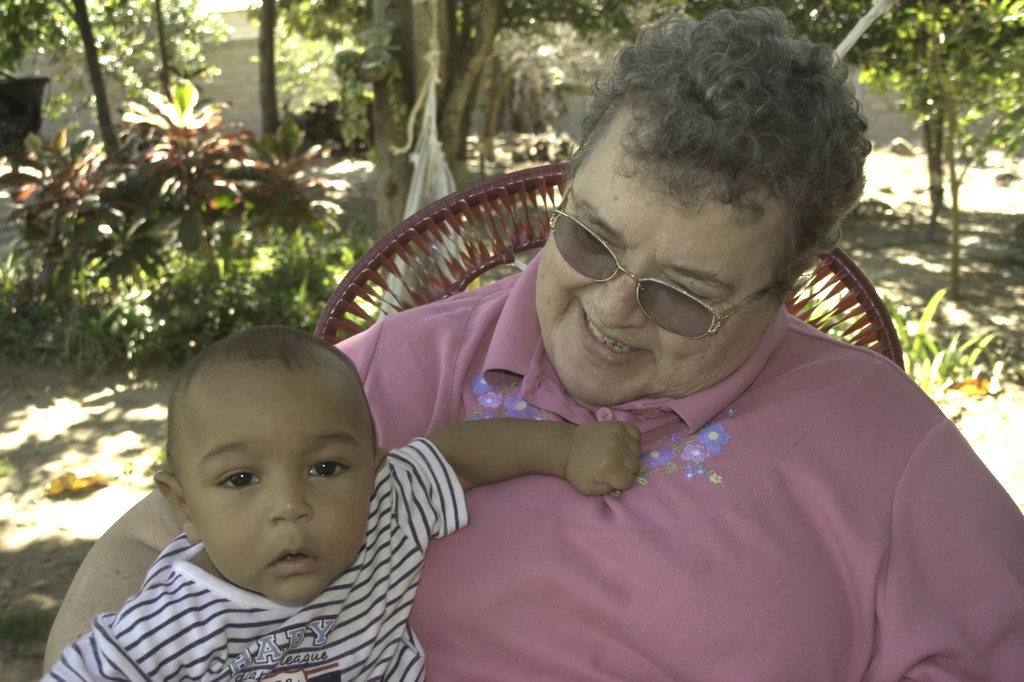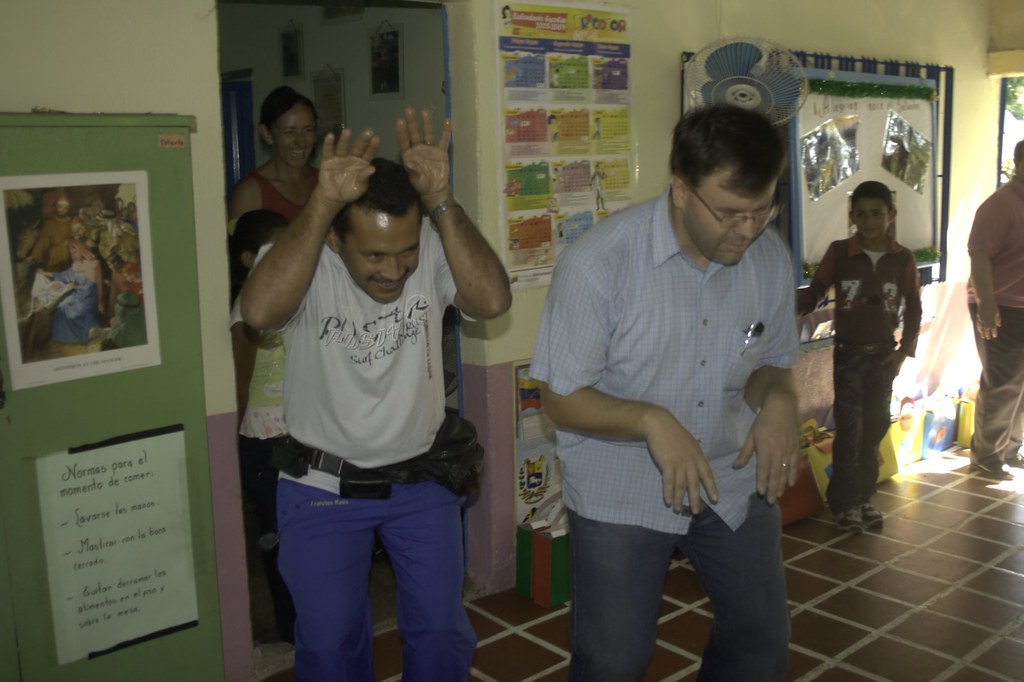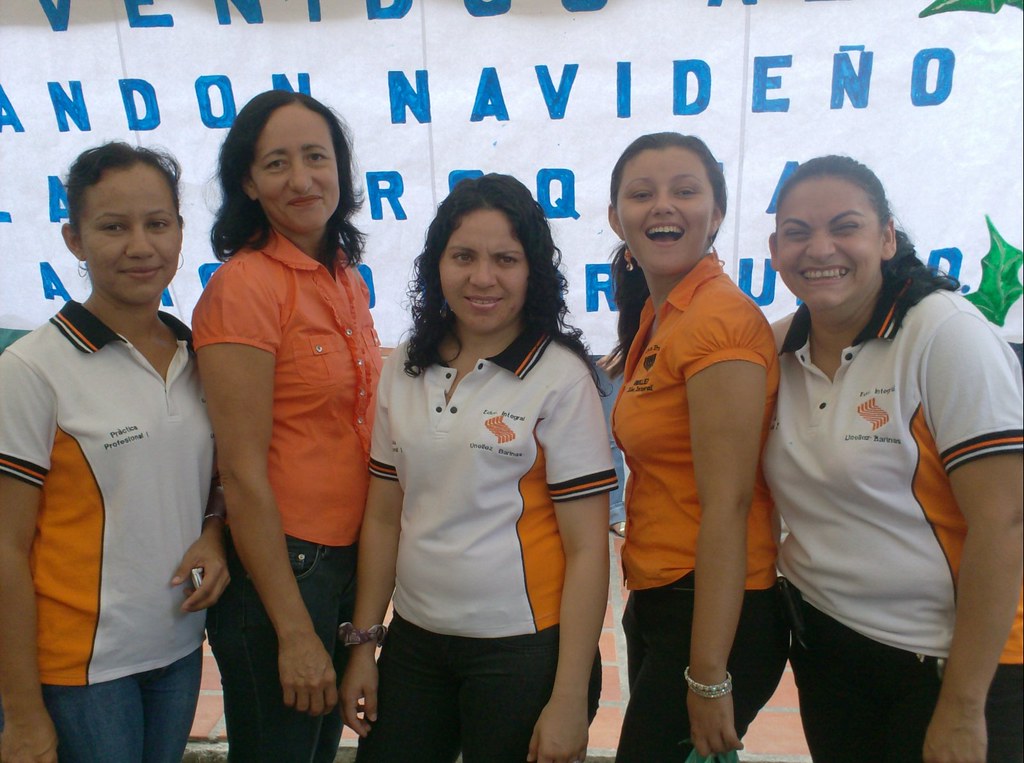 Before I talk about my ordination, I would like to relate something that happened the day before.
Before I talk about my ordination, I would like to relate something that happened the day before.My mother, Jeannette Ernst, had traveled to Venezuela to attend the ordination service and she and I were talking with Sandra Saville of Tierra de Gracia Lutheran Farm in eastern Venezuela on Friday morning, Dec. 12, 2008. We shared our memories of some old friends of the family, Juraine and Lorene Hornig.
Juraine Hornig was born and raised a member of Trinity Evangelical Lutheran Church of Yale, South Dakota, the congregation that my father served as pastor during the 1960s. Juraine was a little younger than my Dad and graduated from Concordia Seminary, St. Louis, in 1957, at which time Dad was serving his second parish in western South Dakota. From the seminary, Juraine and Lorene, who he married in 1955, went to the remote Mountain Province of the Philippine Islands to establish a mission among the Kalangoya-speaking people of Ifugao and Nueva Viscaya.
Two weeks before the Hornigs arrived, two American businessmen in the area were killed and their heads put up on stakes as a warning to all foreigners to stay away. But the Hornigs were not dismayed and Lorene, a registered nurse, established and managed a clinic while Juraine opreached and planted churches. In 1967 they were "adopted" by the village of Buguias, Benguet, the Philippines, a high honor. Although the Hornigs left the area in 1969, as a result of their mission work there are today 25 Lutheran churches and five national pastors among the Kalangoya.
The Hornigs would often visit Yale on their furloughs. I always was fascinated by their stories of life in the Philippines and a little in awe of two people from our little corner of the world who had traveled to such a high and far-off place.
After 12 years of service in the Philippines, the Hornigs returned to the United States where Juraine accepted a call to serve as pastor of St. Paul's Lutheran Church of Ogallala, Nebraska. In 1982 and 1983, the Hornigs traveled to India to serve as short-term mission consultants there. In 1985 the Hornigs returned to the Philippines and worked in the city of Olongapo. In 1989 they again came back to the U.S. where Juraine served as pastor of St. John´s Lutheran Church, Howard, South Dakota, until his retirement in 1997. After retirement, the Hornigs went on short-term missionary assignments to India, Sudan and Kenya.
After we had told Sandra how much the Hornigs had inspired both of us, Sandra went downstairs and noticed Juraine's name while she was reviewing LCMS World Mission news.
Juraine Hornig had passed away on Monday, December 8, 2008. As I learned a few days afterwards, his funeral service was held in Huron, South Dakota, and his body was committed to the earth at Yale, South Dakota, on Saturday, December 13, the same day that I was ordained a missionary in Caracas, Venezuela.
One must be careful about reading too much into these kind of things, but it was hard for me not to interpret this event occurring when it did as a sign that ordination was a step God wanted me to take. At any rate, I always give thanks for the great cloud of witnesses in my life, both family and friends, who have given testimony to Christ only only in their style of life, but also in their manner of death. I also could not help but think in that moment of the old ordination hymn:
"God of the prophets, bless the prophet's sons;
Elijah's mantle o'er Elisha cast.
Each age its solemn task may claim but once;
Make each one nobler, stronger, than the last.
"Make them apostles, heralds of Thy Cross;
Forth may they go to tell all realms Thy grace.
Inspired of Thee, may they count all but loss
And stand at last with joy before Thy face."
The laying on of hands
As for the ordination service, it proceeded much as planned. I was ordained with Eduardo Flores and Sergio Maita in El Salvador Lutheran Church. There was a total of 125 people present and 13 pastors for the laying on of hands. The pastors were:
- Ted Krey, who preached the sermon on Luke 10:1-12 (the sending of the 70);
- Adrian Ventura, president of the Lutheran Church of Venezuela and pastor of Cristo Rey Lutheran Church in Maturin, Monagas;
- Alfonso Prada, pastor of El Salvador Lutheran Church;
- Amichel Ventura, Pastor Adrian's brother and pastor of Bethel Lutheran Church, Rio Chiquito, Monagas;
- Eduardo Castillo, pastor of El Redentor Lutheran Church, San Antonio de Maturin, Monagas;
- Raimundo Brito, pastor of Emmanuel Lutheran Church in the state of Sucre;
- Alcides Franco, senior pastor of La Reforma Lutheran Church, San Felix de Guayana, Bolivar;
- Jonathan Franco, Pastor Alcides' son, who will soon journey to Argentina;
- Luis Moya, also a pastor at La Reforma in San Felix de Guayana;
- Abel Garcia, director of the Juan de Frias Theological Institute and pastor of Cristo es el Camino Lutheran Church in Barcelona, Anzoategui;
- Miguelangel Perez, national missionary in Barquisimeto, Lara;
- Jose Urbina, pastor of La Fe Lutheran Church, Valencia, Carabobo;
- Marco Valencia, pastor of La Fortaleza Lutheran Church, Maracay, Aragua.
Seven seminary students were given their assignments as vicars:
- Francisco Rafael Flores (Eduardo's brother) was assigned to Tierra de Gracia Lutheran Farm;
- Alonso Franco (another son of Alcides Franco) was assigned to Corpus Christi Lutheran Church in Barinas for four months and for the rest of his vicarage, Fuente de Vida Lutheran Church in Puerto Ordaz;
- Juan Carlos Morales, assigned to La Fortaleza, Maracay;
- Juan Carlos Silva will continue his vicarage for another year in Maracay;
- Angel Eliezer Mendoza, assigned to El Paraiso Lutheran Church in Barquisimeto;
- Isaac Machado, also assigned to El Paraiso, Barquisimeto;
- Luis Miguel Silva (brother of Juan Carlos Silva), assigned to Cristo es el Camino, Barcelona.
Jonathan Franco received the blessing of the Venezuelan church as he prepares to spend two years in advanced theological studies at Concordia Seminary, Buenos Aires, Argentina.
Frankly, much of the service was a blur to me until the moment that we took our ordination vows. That was because I had woke up at 2 a.m. that morning and commenced meditating on the words of the ordination vow from that hour until when we spoke them.
The ordination vow is a solemn oath before God and the visible assembly of believers that essentially consists of two parts. On the one hand it is a public confession of faith, a reaffirmation of the pledges taken at baptism and confirmation. On the other hand, it is a promise to perform certain tasks in conformity with these beliefs, all with the help of the Holy Spirit:
1.To publicly preach the Word of God, both the condemnation of sin and the hope of redemption in Jesus Christ;
2.To publicly administer the sacraments of baptism and Holy Communion, the visible means of grace, in accordance with the command and clear teaching of our Lord;
3.To instruct the disciples of Christ in sound doctrine;
4.To provide a model of the Christian life and avoid bringing scandal and disgrace upon the pastoral office and Christ's church;
5.To provide for the spiritual needs of God's flock in times of trial (i.e., to visit the sick and bereaved).
Once taken, this vow cannot be taken back. It is understood as a dedication of the rest of one's life to the office of the holy ministry. One may not abandon one's call for an offer of higher pay and better living conditions. One may not abandon one's call because the sheep are a stubborn, disobedient lot. Under certain circumstances, one may be honorably relieved by the church of the specific responsibilities of the pastoral office (the development of chronic health problems, for example). But regardless of what external circumstances may dictate, one will one day have to give account of one's “stewardship of God's mysteries” before Christ enthroned in glory, especially in regard to the teaching of false doctrine and immoral conduct.
The pastoral office is both apostolic and Christological, because Christ Himself ordained the original apostles and authorized them to speak in His name. The Great Commission (Matthew 28:16-20) was given directly to the 11 remaining apostles and only indirectly to the church as a whole. It is the responsibility of the whole church to train and send pastors into the world to preach the Scriptures (Romans 10:15). To the degree that pastors are faithful to the words of the canonical Scriptures, they speak with the authority of Christ, but unlike the original apostles, may not add anything to the Biblical canon.
Thus, taking the vow of ordination presupposes that one has diligently and thoroughly studied the Holy Scriptures and the various interpretations of it, and is certain of the correct one. Implicit in the idea that if the Bible is the infallible rule of faith, the pure apostolic doctrine may be derived from it. This is most offensive to modern and “postmodern” sensibilities which scorn the very concept of absolute truth.
Nevertheless, like my grandfather's synod, the Lutheran Church of Venezuela requires a “quia” rather than a “quatenus” subscription to the Scriptures as the rule of faith and the Unaltered Augsburg Confession, the Apology of the Augsburg Confession, the Smalcald Articles and the Formula of Concord as the clearest expositions of scriptural, apostolic doctrine. “Quia” is the Latin word for “because”, as in, “The Lutheran Confessions are true because they agree with the Bible”. “Quatenus” means “insofar as” as in, “The Lutheran Confessions are true insofar as they agree with the Bible.”
The question that those who insist on a “quatenus” subscription must answer is this: If the Lutheran Confessions are not in 100 percent agreement with the Holy Scriptures, at what point do the Scriptures go one way and the Confessions the other? If this point cannot be identified, than what they really mean by “quatenus” is “The Lutheran Confessions are true insofar as I think they agree with the Bible.”
But, again, if one is not willing to abandon any notion of private interpretation, one should not take the vow of ordination. The Bible verse I was given for my ordination was 2 Timothy 3:16:
“All Scripture is given by inspiration of God, and is profitable for doctrine, for reproof, for correction, for instruction in righteousness.”
Following the ordination and assignment of the vicars, Eduardo, Sergio and I celebrated the sacrament of Holy Communion. I consecrated the elements while Sergio and Eduardo distributed them. I had also made some attempt to memorize the words of institution in Spanish, but they were printed on a little card on the altar in front of me, just in case.
The next morning, Luz Maria, my mother and I attended the regular Advent service at El Salvador in which I helped Pastor Alfonso Prada serve communion.
My mother's tour of Venezuela

My mother had a wonderful time in Venezuela, although she was worried about getting on the plane by herself and not knowing any Spanish. There proved to be little difficulty in getting her out of the airport, however.
Following the ordination, we brought my mother to La Caramuca, along with Ted and Rebecca Krey, and Francisco and Sandra Mania from El Paraiso Lutheran Church, Barquisimeto. Francisco and Sandra have been very active in organizing Sunday schools and vacation Bible schools at various mission stations in Barquisimeto, even donating their old house for use as a mission house. It was their first visit to La Caramuca and we were pleased to have them there.

We hosted a special Christmas party for all the children while my mother and the rest were there. Sandra persuaded her husband, Francisco, and Pastor Krey to act like donkeys for the popular Venezuelan Christmas carol, “Mi Burrito Sabanero”.
Luz Maria's work in the schools
Luz Maria has not been idle during all my preparations for ordination. She expects to complete her studies for a fifth-level teaching certificate by March. It is necessary for her to have this accreditation if we are to expand our school. Since September 15, Luz Maria has been visiting schools in and around the city of Barinas, observing and making presentations. For her last assignment, she showed the children “The Story of Jesus,” a DVD adapted from the film, "Jesus", by the Jesus Film Project.

No comments:
Post a Comment